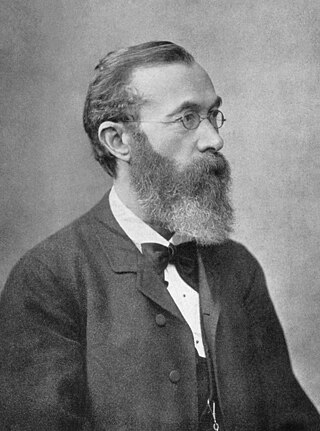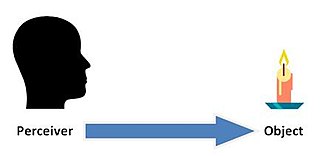Related Research Articles

Consciousness, at its simplest, is awareness of internal and external existence. However, its nature has led to millennia of analyses, explanations, and debate by philosophers, scientists, and theologians. Opinions differ about what exactly needs to be studied or even considered consciousness. In some explanations, it is synonymous with the mind, and at other times, an aspect of it. In the past, it was one's "inner life", the world of introspection, of private thought, imagination, and volition. Today, it often includes any kind of cognition, experience, feeling or perception. It may be awareness, awareness of awareness, metacognition, or self-awareness either continuously changing or not. The disparate range of research, notions and speculations raises a curiosity about whether the right questions are being asked.

The philosophy of perception is concerned with the nature of perceptual experience and the status of perceptual data, in particular how they relate to beliefs about, or knowledge of, the world. Any explicit account of perception requires a commitment to one of a variety of ontological or metaphysical views. Philosophers distinguish internalist accounts, which assume that perceptions of objects, and knowledge or beliefs about them, are aspects of an individual's mind, and externalist accounts, which state that they constitute real aspects of the world external to the individual. The position of naïve realism—the 'everyday' impression of physical objects constituting what is perceived—is to some extent contradicted by the occurrence of perceptual illusions and hallucinations and the relativity of perceptual experience as well as certain insights in science. Realist conceptions include phenomenalism and direct and indirect realism. Anti-realist conceptions include idealism and skepticism. Recent philosophical work have expanded on the philosophical features of perception by going beyond the single paradigm of vision.

Wilhelm Maximilian Wundt was a German physiologist, philosopher, and professor, one of the fathers of modern psychology. Wundt, who distinguished psychology as a science from philosophy and biology, was the first person ever to call himself a psychologist.

Phenomenology is the philosophical study of objectivity and, more generally, reality as subjectively lived and experienced. It seeks to investigate the universal features of consciousness while avoiding assumptions about the external world, aiming to describe phenomena as they appear to the subject, and to explore the meaning and significance of the lived experiences.
Solipsism is the philosophical idea that only one's mind is sure to exist. As an epistemological position, solipsism holds that knowledge of anything outside one's own mind is unsure; the external world and other minds cannot be known and might not exist outside the mind.
Intentionality is the mental ability to refer to or represent something. Sometimes regarded as the mark of the mental, it is found in mental states like perceptions, beliefs or desires. For example, the perception of a tree has intentionality because it represents a tree to the perceiver. A central issue for theories of intentionality has been the problem of intentional inexistence: to determine the ontological status of the entities which are the objects of intentional states.

Johann Friedrich Herbart was a German philosopher, psychologist and founder of pedagogy as an academic discipline.
Experience refers to conscious events in general, more specifically to perceptions, or to the practical knowledge and familiarity that is produced by these processes. Understood as a conscious event in the widest sense, experience involves a subject to which various items are presented. In this sense, seeing a yellow bird on a branch presents the subject with the objects "bird" and "branch", the relation between them and the property "yellow". Unreal items may be included as well, which happens when experiencing hallucinations or dreams. When understood in a more restricted sense, only sensory consciousness counts as experience. In this sense, experience is usually identified with perception and contrasted with other types of conscious events, like thinking or imagining. In a slightly different sense, experience refers not to the conscious events themselves but to the practical knowledge and familiarity they produce. Hence, it is important that direct perceptual contact with the external world is the source of knowledge. So an experienced hiker is someone who has actually lived through many hikes, not someone who merely read many books about hiking. This is associated both with recurrent past acquaintance and the abilities learned through them.
Introspection is the examination of one's own conscious thoughts and feelings. In psychology, the process of introspection relies on the observation of one's mental state, while in a spiritual context it may refer to the examination of one's soul. Introspection is closely related to human self-reflection and self-discovery and is contrasted with external observation.

In the philosophy of perception and philosophy of mind, direct or naïve realism, as opposed to indirect or representational realism, are differing models that describe the nature of conscious experiences; out of the metaphysical question of whether the world we see around us is the real world itself or merely an internal perceptual copy of that world generated by our conscious experience.
A mental state, or a mental property, is a state of mind of a person. Mental states comprise a diverse class, including perception, pain/pleasure experience, belief, desire, intention, emotion, and memory. There is controversy concerning the exact definition of the term. According to epistemic approaches, the essential mark of mental states is that their subject has privileged epistemic access while others can only infer their existence from outward signs. Consciousness-based approaches hold that all mental states are either conscious themselves or stand in the right relation to conscious states. Intentionality-based approaches, on the other hand, see the power of minds to refer to objects and represent the world as the mark of the mental. According to functionalist approaches, mental states are defined in terms of their role in the causal network independent of their intrinsic properties. Some philosophers deny all the aforementioned approaches by holding that the term "mental" refers to a cluster of loosely related ideas without an underlying unifying feature shared by all. Various overlapping classifications of mental states have been proposed. Important distinctions group mental phenomena together according to whether they are sensory, propositional, intentional, conscious or occurrent. Sensory states involve sense impressions like visual perceptions or bodily pains. Propositional attitudes, like beliefs and desires, are relations a subject has to a proposition. The characteristic of intentional states is that they refer to or are about objects or states of affairs. Conscious states are part of the phenomenal experience while occurrent states are causally efficacious within the owner's mind, with or without consciousness. An influential classification of mental states is due to Franz Brentano, who argues that there are only three basic kinds: presentations, judgments, and phenomena of love and hate.

The Philosophy of Freedom is the fundamental philosophical work of philosopher, Goethe scholar, and esotericist Rudolf Steiner (1861–1925). It addresses the question of whether and in what sense human beings are free. Originally published in 1894 in German as Die Philosophie der Freiheit, with a second edition published in 1918, the work has appeared under several English titles, including The Philosophy of Spiritual Activity, The Philosophy of Freedom, and Intuitive Thinking as a Spiritual Path.
In metaphysics, Metaphysical solipsism is the variety of idealism which asserts that nothing exists externally to this one mind, and since this mind is the whole of reality then the "external world" was never anything more than an idea. It can also be expressed by the assertion "there is nothing external to these present experiences", in other words, no reality exists beyond whatever is presently being cognized by that one mind. The aforementioned definition of solipsism entails the non-existence of anything presently unperceived including the external world, causation, other minds, the past or future, and a subject of experience. Despite their ontological non-existence, these entities may nonetheless be said to "exist" as useful descriptions of the various experiences and thoughts that constitute 'this' mind
Enactivism is a position in cognitive science that argues that cognition arises through a dynamic interaction between an acting organism and its environment. It claims that the environment of an organism is brought about, or enacted, by the active exercise of that organism's sensorimotor processes. "The key point, then, is that the species brings forth and specifies its own domain of problems ...this domain does not exist "out there" in an environment that acts as a landing pad for organisms that somehow drop or parachute into the world. Instead, living beings and their environments stand in relation to each other through mutual specification or codetermination" (p. 198). "Organisms do not passively receive information from their environments, which they then translate into internal representations. Natural cognitive systems...participate in the generation of meaning ...engaging in transformational and not merely informational interactions: they enact a world." These authors suggest that the increasing emphasis upon enactive terminology presages a new era in thinking about cognitive science. How the actions involved in enactivism relate to age-old questions about free will remains a topic of active debate.
In philosophy, transcendental apperception is a term employed by Immanuel Kant and subsequent Kantian philosophers to designate that which makes experience possible. The term can also be used to refer to the junction at which the self and the world come together. Transcendental apperception is the uniting and building of coherent consciousness out of different elementary inner experiences. For example, the experience of "passing of time" relies on this transcendental unity of apperception, according to Kant.
Structuralism in psychology is a theory of consciousness developed by Edward Bradford Titchener. This theory was challenged in the 20th century.
Romantic epistemology emerged from the Romantic challenge to both the static, materialist views of the Enlightenment (Hobbes) and the contrary idealist stream (Hume) when it came to studying life. Romanticism needed to develop a new theory of knowledge that went beyond the method of inertial science, derived from the study of inert nature, to encompass vital nature. Samuel Taylor Coleridge was at the core of the development of the new approach, both in terms of art and the 'science of knowledge' itself (epistemology). Coleridge's ideas regarding the philosophy of science involved Romantic science in general, but Romantic medicine in particular, as it was essentially a philosophy of the science(s) of life.
Buddhist thought and Western philosophy include several parallels.
The rule consciousness as one of the primary factors of personality out of sixteen as categorized by Raymond Cattell, 1946 as low and high level. The descriptors of low level rule consciousness are expedient, nonconforming, disregards rules, self-indulgent or having a low super ego strength while the high level consciousness are rule-conscious, dutiful, conscientious, conforming, moralistic, staid, rule bound or having high super ego strength.
Die Seele: Ihr Verhältnis zum Bewusstsein und zum Leibe is a book by the German philosopher and psychologist Joseph Geyser was published in the journal "Wissen und Forschen " in 1914.
References
- 1 2 3 One or more of the preceding sentences incorporates text from a publication now in the public domain : Chisholm, Hugh, ed. (1911). "Apperception". Encyclopædia Britannica . Vol. 2 (11th ed.). Cambridge University Press. p. 221. This cites:
- Karl Lange, Ueber Apperception (6th ed. revised, Leipzig, 1899; trans. E. E. Brown, Boston, 1893)
- G. F. Stout, Analytic Psychology (London, 1896), bk. ii. ch. viii.
- 1 2 3 Runes, Dagobert D. (ed.), Dictionary of Philosophy, Littlefield, Adams, and Company, Totowa, NJ, 1972.
- ↑ Lipps, Theodor. Vom Fuehlen, Wollen und Denken. Leipzig, Verlag von Johann Ambrosius Barth, 1902. See pages 6-7.
- ↑ Judgement and Truth in Early Analytic Philosophy and Phenomenology. ed. Mark Textor. Springer, 2013. pp. 14f.
- ↑ Adler, Alfred (2011). "The Science of Living".
- ↑ Ott, Christopher, The Evolution of Perception and the Cosmology of Substance, iUniverse, 2004.